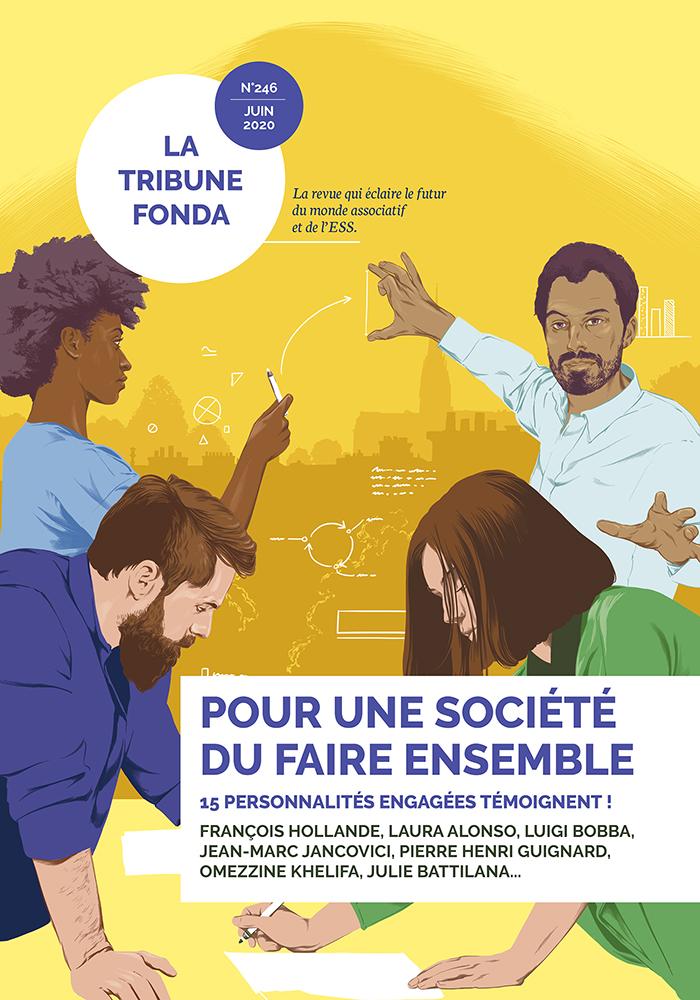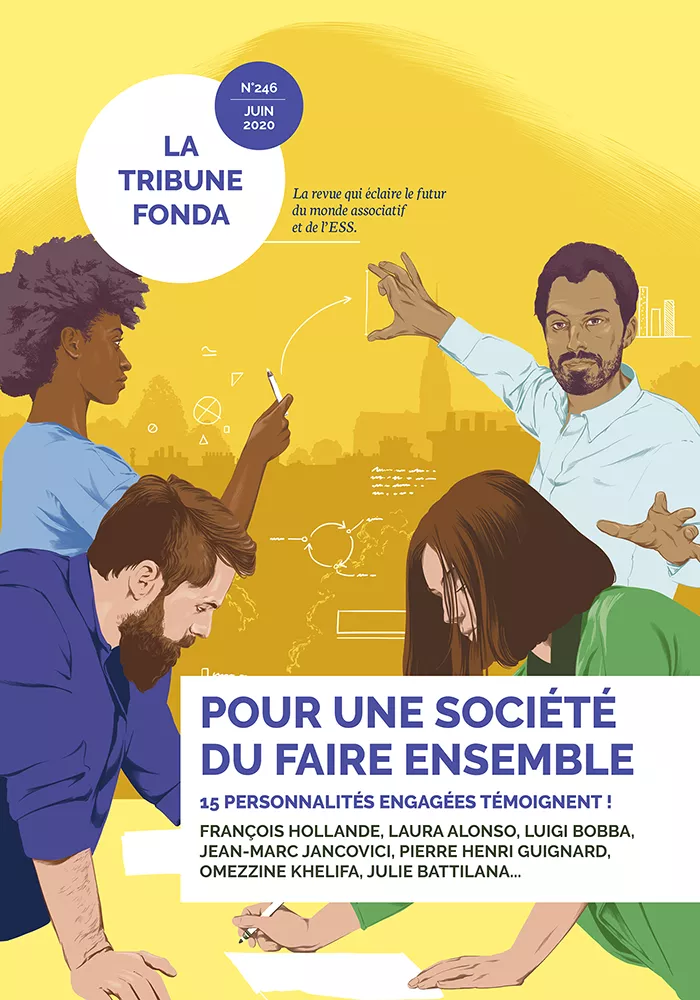Let's say it without beating around the bush: we did not see this coming! Or more accurately, when the issue was raised, we simply did not want to believe that a world crisis, like the one that we are experiencing today, would actually happen. It seemed too outrageous and went beyond our logical frameworks. However, our planet has experienced many pandemics: SARS, Ebola, Bird flu, Chikungunya, and AIDS. This issue was supposed to celebrate the 10th anniversary of our Faire Ensemble programme. A decade of strategic foresight in order to move beyond "managing emergency situations and look to the future, by foreseeing change, with a view to developing adaptation and change strategies."1 La Fonda sought to bolster "civil society's capacity to take action in today's and tomorrow's society." We are not in any way renouncing our initial ambitions; so many of the radical changes that we identified are in fact taking place. But we must review the scenarios in the light of the irreversible sea changes that we are experiencing.
It would be helpful if crises were kind enough to give some advance warning. Nevertheless, it is our responsibility to foresee them. When they occur, the worst habits inexorably return: the belief that closing borders would be enough to stem a pandemic which pays little heed to social or ethnic backgrounds. However, sovereignty has never put an end to a pandemic, as pandemics are inherently universal. This crisis is shaking our most deeply-held certainties. When it began, in reality we had no scientific, sociological, political or economic information which could be used to grasp the consequences. Our Cartesian and rational thinking must now take into consideration a litany of figures that reveal the unthinkable: over 371,700 deaths worldwide2, half of the world in lockdown, and the economy practically at a standstill. The President of Germany, Frank-Walter Steinmeier, made a very apt first observation: the Coronavirus pandemic "is not a war", but instead is a "test of our humanity."3
However, we are conning ourselves if we say that we were unaware that this could happen. The 1972 Meadows Report (also called The Limits to Growth Report) highlighted the risk of the global system collapsing. To a different degree, the 2015 Paris Climate Agreement was a (feeble) effort to raise global awareness about the need to take climate action. 2020 will therefore have been a trigger that will have consequences over the coming decades. Our crisis exit strategy choices will have particularly irreversible consequences as they will make a mark on entire generations in every aspect of our lives: health, education and work... This is why nothing can be decided behind closed doors, solely at the national level.
What kind of economy for the future? Unilateral proposals and lobbies of all kinds have been in plentiful supply. Demonstrating crass cynicism, they have not hesitated to attack our fundamentals: the Labour Code, environment, and healthcare, under the pretext of stepping up the pace of the economic recovery. But what kind of recovery is it? A recovery which damages our ecosystems, welfare systems, and health? Should we get back on the path of unbridled globalisation at the risk of speeding up the brutality of the next health and environmental crisis which we know is in gestation? Should we sign away our future, for instance by going back on our commitments to reduce CO2; commitments that have already been formalised?
Is this not finally the opportunity to free ourselves from the shackles of the economic theory of the Chicago school of economic thought, which states that the purpose of a corporation is to solely maximize profits for shareholders? Should the economy of the future not be social by massively investing in skills for an equitable, sustainable and lasting society that does not leave anyone behind? Have these weeks of enforced lockdown not demonstrated the real value of local employment and the strength of community solidarity?
The need to reinvest in the real economy in order to leave behind unchecked capitalism, whose only purpose is to finance the stock market, has (again) come to light at this time. And with a brutal reminder: the invisible hand of the market is a poor regulator which in no way justifies the absence of democratic oversight. Without a doubt, the next few years will be unprecedentedly tough from an economic perspective, meaning that it is even more crucial to determine a point of no return in order to avoid nationalism and individualism. In that, the financial stability plan and the Green New Deal championed by the European Commission are an appropriate response. However, more than any plans or deals, we need a vision for society!
Faire ensemble. As Gramsci emphasized, each individual plays a part in maintaining or overturning the culture of a society. The capacity to take action is therefore in our hands: we are involved in a vision of the world that we are building and to which we add value. Therefore, it is not the state that is central, but each of us, as "political beings."4 Politics is not the sole preserve of professional practitioners: it is a means and not an end in itself. It should not only be about "organising communal life"5 with the end goal being human development. Let's not abandon the realms of the imagination: daring to say that we do not know should not stop us from saying what we want as the ideal for the future.
No demand to change will facilitate a Faire ensemble (working together) dynamic. But we need to be wary of being the only people in the room with good intentions. The battle for the world of tomorrow will be ruthless and neoliberals do not have our reticence, nor do they have any scruples about taking advantage of their dominant position.
If, as civil society stakeholders, we want to influence the future of the world, we will need to be influential, and we need to join forces in order to achieve this. "Reality is quick to fill the slightest crack that appears in the ideal."6 We also need to finally become aware of the real weight of third-sector stakeholders and more broadly of the social economy as a transformative power. The future world will hinge on our mobilisation. The alternative will be a worse version of this world. We have many allies. The Sustainable Development Goals (SDGs) are their emblem. Collective impact strategies are their tools. The 21st century that we ourselves will have created will hinge on our mobilisation. Otherwise, just like Stefan Zweig, we will have to learn the "beneficial art of not bemoaning what is lost"7 in this world of yesterday.
Some work on this issue began before the Coronavirus crisis. The issue contains 15 interviews with leading figures about their vision of Faire ensemble: grassroots stakeholders, those working in institutions, politicians, researchers... In their own way, they describe their vision of the world of the future. Each of them was given an opportunity to respond to the challenges of the 2030 Agenda for Sustainable Development as the central theme of this issue. We are not claiming to be exhaustive or to offer "ready-made answers". We are simply endeavouring to contribute to a collective process in order to tackle a paradox: how can we think long term, while seeking immediate responses?
- 1Faire ensemble 2020 : la Fonda relève le défi !, Édito de La Tribune Fonda n°208, Avril 2011.
- 22020, June 1st.
- 3AFP, 2020/04/11.
- 4George Hoare et Nathan Sperber, Introduction à Antonio Gramsci, La Découverte, 2019.
- 5Hannah Arendt, Qu’est-ce que la politique ?, Éditions du Seuil, 2014.
- 6Jean Rostand, Pages d’un moraliste, 1952.
- 7Stefan Zweig, Le Monde d’hier, Gallimard, 2013.


